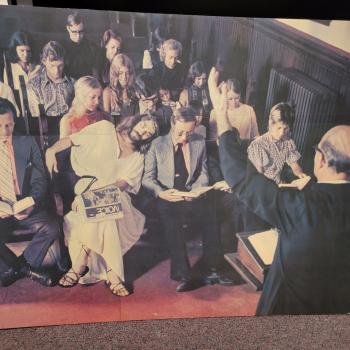Some books can be swallowed quickly, others require slower eating, and some need to chewed very carefully (and sometimes one must carefully spit out the indigestible bits). Ronald Osborn’s book is one of the latter sort. It is an excellent read, even eloquent in places, and it does a very good job of raising a lot of the right questions about creation science, intelligent design, and Biblical interpretation in those approaches to Genesis 1-3. Osborn is a Seven Day Adventist, who, it should be said, is basically at odds with much of what comes out of that denomination’s institutions about young earth seven day creationism. But his Adventist approach to things does occasionally come through, for example in his ode to the sabbath and its observance at the end of this provocative slender book (only 191 pages, published by IVP this year, and we could have hoped for more). If Osborn has a lover’s quarrel with his own denominational proclivities when it comes to evolution vs. creation science and the like, it is part of his larger concerns with creation science in general, and its problematic exegesis, and even more problematic science.
This book consists of two parts, which are unevenly divided. The first part, which deals with more philosophical and hermeneutical issues consumes the first 121 pages of the book (of only 179 pages of text) while the actual dealing with the presenting issue advertized on the cover of animal suffering, even before the Fall, is dealt with in the second half of the book. For my money the brief exegetical introduction to Gen. 1-2 should have been saved for the second half of the book, but I understand why it was offered early on in the study, as a sort of deck-clearing operation.
This book is very good at raising many of the right questions, and showing many of the problems with literal interpretation of Genesis, less good at providing answers to the presenting issue featured in the title of the book. It is something of a surprise to me that the first part of the book doesn’t really deal with the issue of epistemology (how we know what we know), or for that matter theories of meaning (ala ‘Is There a Meaning in This Text’). This is unfortunate, because much is presupposed on this front, and little explained. It’s clear enough that Osborn has issues with various sorts of foundationalism, which he critiques in various ways in the course of his discussion, despite the fact that he obviously is a committed Christian for whom certain beliefs are not merely non-negotiables, they are ‘foundational’ for his thinking. I do not think one can escape a commitment to certain foundations of the faith and still remain a Christian. In other words, the Bible doesn’t real encourage an all too post-modern approach to meaning, truth, and the like. Nor does it encourage us to embrace Barth’s dictum (quoted in this book) that the Bible is not a revelation from God, but rather a mere witness to Christ who is the revelation of God. 2 Tim. 3.16 and other texts do not encourage such a view (see my book The Living Word of God). Christ is certainly the clearest revelation of God’s nature and character, but it is interestingly the Word of God preached (i.e. the Gospel) which is most often called the Word of God in the NT (see Acts and e.g. 1 Thess. 2.13). Osborn however is right as rain about the problems with interpreting poetic texts like the Genesis creation stories in a literalistic way as if they were some sort of scientific textbook downloaded on an unsuspecting and unprepared people in a pre-scientific era. And it is this major critique of such literalism in this book where Osborn is most helpful, and most devastating.
I like to start with something positive about a book, and we find that early on (p. 27) in Osborn’s comments on freedom: “The Creator initiates emergent and generative processes that anticipate a continuous creation with… ‘secondary causes.’ God desires a world that will in some sense be free from his direct control, and the creation is in certain ways marked from the very first moment by the presence of freedom. Freedom, we might say is precisely one of the things that God creates. But the only way that freedom can be created is by opening a space in which freedom occurs and unfolds. The key refrain Let, Let there be, Let the waters, Let the earth’ should serve as a clarion signal that God’s way of bringing order out of chaos involves not only directly fashioning or controlling but also granting, permitting, delegating. We must think of the creation not only in terms of divine action but also in terms of divine restraint.” I quite agree with this. Freedom, and so a degree of ‘indeterminancy’ was structured in the created order from the beginning. And further more, God did not simply create ex nihilo. Osborn is quite correct that he also fashioned some things out of stuff previously made (for example Adam), and he also set up processes of development over time, giving tasking to both animals and humans to be fruitful and multiply, which is to say, to be mini-creators in the divine economy of things. Notice for instance how in Gen. 2.19 God creates not just Adam (whose name likely means earth creature) but beasts of the field from out of the ground. There is a profound and inherent relationship between creatures and the earth itself from the outset, according to Genesis.
One of the major points Osborn presses, which is worth pondering, is that God’s creation is created good, indeed very good, but nothing is said about perfection. He critiques the rather frequent assumption and assertion that there was no suffering, no death no etc. before the Fall. Indeed, it is Osborn’s view that Adam was placed in the Garden to protect him from a world either already gone wrong, or a world that at least was not entire safe. This reminds me of the comment about Aslan when it is asked in The Lion, the Witch, and the Wardrobe whether Aslan is safe, the answer is “Oh no, he’s not safe, but he is good”. Just so the creation— it was good, but it wasn’t safe.
Osborn later in the book contemplates C.S. Lewis suggestion that there was cosmic evil before the Garden of Eden (which would explain the snake in the Garden), and so there was suffering etc. before the Fall. It is not however clear to me that when we are dealing with sub-human species of creatures that we are dealing with issues of Christian ethics directly. What I mean by this is that while human behavior towards animals is certainly an ethical issue, the very fact that there are predators in the animal kingdom, and life is sustained in one animal by the very death of another in itself should not be called an issue of ‘natural evil’. Indeed, I would add that calling earthquakes, tornadoes etc. which are perfectly normal natural phenomena as inherently evil is also a big mistake. If for example an earthquake happens on a remote island with no human population, it does not raise any ethical issues. It only becomes an issue when human beings get in the way of such natural processes (think Pompeii) and then indeed it raises some questions. And if we further raises the question of why a good God would allow such suffering or ‘natural disasters’ (euphemistically called ‘acts of God’ by the insurance companies), there is a ready answer— God set up the universe with a modicum of freedom, including human beings freedom of choice to, among other things, live where they ought not to live. In other words, its not so much of a theodicy problem as a human stupidity problem unless you are an absolute pre-determinist in your theology. I agree with Osborn’s point that Adam is called upon to subdue the earth (the word coming from the military field) and this suggests it required subduing. In other words, all suffering, all contingency, all resistance to change, cannot be blamed on the Fall. The Fall, if, as I think, it was an historical event effects humans directly, and their relationship to the earth secondarily, and their relationship to other creatures as well– but it is mainly our imposition of fallen ways, it is mainly our abuse of the earth and its creatures that has caused the world to be a fallen place— a place for example with global climate change. No use laying pollution at the door of God. As Pogo once said “I’ve seen the enemy, the enemy is me”. The fact that Paul says God subjected the creation to futility, can just as easily be read God subjected fallen humans to futility (it depends on what ktisis means in that context in Romans 8), and even if it is creation, it could be that creation was subjected to futility by the ones God designated to be the subduers in the first place— humans (ie. God did it indirectly).
As to the question of whether God would join PETA the answer is no, in view of Gen. 3.16 which tells us God provided skins for Adam and Eve to wear…. and they probably came from animals that had to be killed for that to happen. In other words, I don’t really think you can read things like vegetarianism into God’s agenda, or into what God intended for humans vis a vis their relationship to animals. This is not to say that we should not care for animals, and care about their suffering and alleviate it where possible. It is to say that no totalizing approach to this issue is Biblical.
Osborn quotes John Stott, the dean of Evangelicalism in the U.K. for many years to good effect— “It is most unfortunate that some who debate this issue (evolution) begin by assuming that the word ‘creation’ and ‘evolution’ are mutually exclusive. If everything has come into existence through evolution, they say, then biblical creation has been disproved, whereas if God has created all things, then evolution must be false. It presupposes a very narrow definition of the two terms, both of which in fact have a wide range of meanings” (p. 37). The problem with creation science is that it is neither science, open to all lines of inquiry and taking the facts where one finds them, nor is it good creation theology based on sound exegesis of Genesis 1-2, which is not a scientific text book. I would demur from the conclusion however that Genesis 1-2 does not intend to refer to historical persons and events, in the case of Adam and Eve. Not only Genesis, but also Jesus and Paul in the NT, to name but two, assume these were historical persons, who in some measure and in some fashion are the cause of the passing on of sin and its consequences to their descendents (notice– it is sin, which leads to a certain sort of death which is the issue, not suffering per se). While I take Osborn’s point that there was animal suffering before the Fall, and it requires explanation if God is good, I do not agree that this grants us permission to take the Adam story as having no historical referents or foundations or consequences. The writers of the NT thought otherwise. What I also agree with is that suffering in itself is not a form of evil. Indeed, as Lewis suggested, suffering and pain can be a good God’s early warning system that something is very wrong. If suffering was inherently evil, then it becomes impossible to explain Christ’s death on the cross as something God intended, planned, and suffered for a good end.
I take Osborn’s point that literalistic readings of poetic texts or pre-scientific texts is truly problematic. I quite agree with him that the Bible does not suggest a young earth, and that if it did so then we would have the further problem with God being a deceiver, creating things that have the mere appearance of age which are not in fact very old. On pp. 100ff. Osborn cites to very good effect Calvin, who, as it turns out, does not agree with an absolutely literal reading of Genesis 1-3, but takes a more nuanced approach, as does Augustine, as does Mamonides, and we could go on. Literalism, the shibboleth of fundamentalisms of all sorts in all three monotheistic religions is in many cases a violation of the Biblical text, for if the author decided to speak in a non-literal way, then we need to allow him to do so. We need to interpret the text according to the genre of literature it actually reflects, not according to modernist assumptions that we can ignore the historical etc. contexts of the Bible and simply read it through our all too modern assumptions with no distortion of meaning. This is simply false.
One of the things Osborn does well is recognize that fundamentalism is not necessarily a theological view point, it is a mindset, a mindset that says ‘I know what the plain meaning of the text is, do not confuse me with literary or ancient historical or language considerations. I can simply read the text without distortion and without any presuppositions read into the text’. It is a mindset that reflects the lust for certainty among many Christians in a world full of uncertainty. Fundamentalism is a temporarily comforting response to all the great imponderables about life.
Osborn also insists on the principle that when one is a scientist, then one embraces the hypothesis which does the best job of explaining the hard evidence as we find it. This is not to forget that ‘evolution’ is a theory, for which most scientists believe there is good evidence. But it hardly explains everything, and I would say micro-evolution really is neither here nor there when it comes to the Bible and what it teaches us. By this I mean, it doesn’t really matter whether caterpillars turn into butterflies, or frogs turn into birds, or whatever. What happens at the sub-human level is not really an obstacle to a high view of Scripture or Christian theology. The real presenting issue is where do humans come from, and were they in fact uniquely created? But even then this is not all, because as Stott says, there may have been human like creatures (say homo habilis) before Adam and Eve, who were the first created in God’s image. Even in the Genesis account one must account for where the wives of Cain and Abel came from. My suggestion would be that the Bible does not tell the history of all peoples in all cultures. It tells the story of the origins of God’ people from Adam to Abraham and beyond, and other peoples only enter the story in so far as they come into contact with God’s people. That’s all. In other words the Bible focuses on God’s chosen people and their origins, and to a much less degree on the origins of everyone, except in a very general way in Gen. 1-3. I also agree with Osborn that perhaps the most profound commentary on God as creator is found in the last four chapters of Job, often ignored in the creation debates. It too is poetry like Gen. 1, and it tells us that God is not ‘safe’. He even delights in crocodiles! More on this in the next post.



















